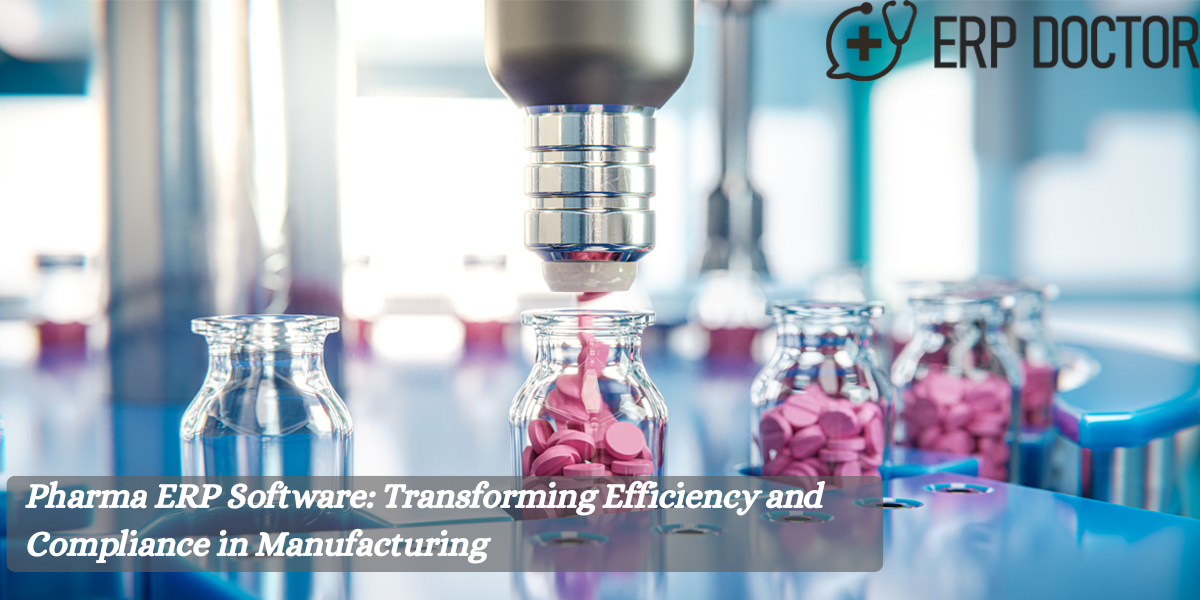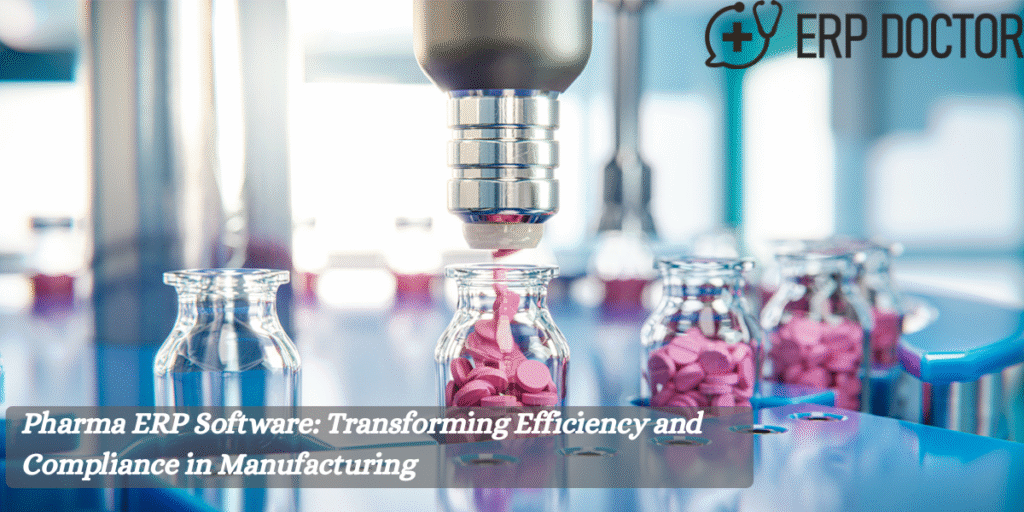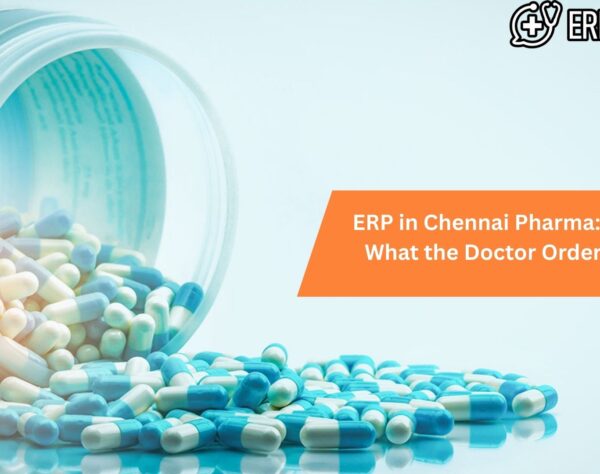
Pharma ERP Software: Transforming Efficiency and Compliance in Manufacturing

Top 7 Challenges Faced by Pharma Manufacturers & How ERP Solves Them
The pharmaceutical manufacturing industry is one of the most regulated and competitive sectors globally. To overcome operational, compliance, and quality challenges, many companies are adopting Pharma ERP Software an integrated solution that streamlines processes, ensures compliance, and boosts overall efficiency.
Using outdated systems or disconnected tools leads to inefficiencies, delays, and costly errors affecting compliance, profitability, and trust. That’s where a Pharma ERP Software for Manufacturers comes in centralizing operations, automating workflows, and ensuring data accuracy across every process.
Why ERP Is Crucial for Pharmaceutical Manufacturers.
In the fast-paced pharma industry, relying on manual data or spreadsheets is no longer viable. A Pharmaceutical ERP System integrates processes like procurement, production, quality, compliance, and finance under a single platform giving complete visibility and control.
With an advanced ERP solution for the pharmaceutical industry, manufacturers can:
- Track production in real-time
- Manage batch and expiry data accurately
- Maintain electronic documentation for audits
- Optimize resource allocation and scheduling
Leading ERP solutions such as SAP Business One, Microsoft Dynamics 365, and Oracle NetSuite are tailored to meet pharma-specific needs helping companies ensure compliance, improve efficiency, and enhance decision-making.ma manufacturing companies. They provide end-to-end visibility, improve collaboration across departments, and ensure regulatory compliance at every stage.
Overcoming Pharma Manufacturing Challenges with ERP Solutions
1. Compliance and Regulatory Management
Challenge:
The pharmaceutical industry is subject to strict regulations such as GMP, FDA, and WHO standards. Manually managing documentation and audits increases the risk of errors and compliance failures.
ERP Solution:
A robust Pharmaceutical ERP System automates compliance tracking, manages electronic documentation, and maintains complete audit trails. This ensures that every process adheres to regulatory standards, helping pharma companies avoid costly fines and maintain trust with regulators.
2. Batch and Expiry Tracking
Challenge:
Tracking batches and expiry dates is critical for safety and recall management. Errors in manual systems can lead to product recalls, compliance breaches, and customer dissatisfaction.
ERP Solution:
An integrated Pharma Manufacturing ERP Software enables real-time tracking of batches and expiry dates. From raw materials to finished goods, every movement is recorded, ensuring traceability, reducing wastage, and maintaining product integrity.
3. Quality Control and Assurance
Challenge:
Maintaining consistent product quality is a major concern in pharmaceutical manufacturing. Manual quality checks can be slow, inconsistent, and error-prone.
ERP Solution:
A Pharmaceutical ERP Solution centralizes quality control by integrating lab results, validation protocols, and production data. Automated checks and alerts ensure that all products meet quality standards before leaving the facility, reducing the risk of defects or recalls.
5. Production Planning and Scheduling
Challenge:
Inefficient production planning results in bottlenecks, underutilized resources, and missed deadlines.
ERP Solution:
A comprehensive Pharma ERP System uses data from demand forecasts, inventory, and production capacity to plan and schedule operations efficiently. Automated scheduling tools help managers allocate resources, optimize workflow, and ensure timely delivery.
6. Data Management and Decision-Making
Challenge:
Critical data in spreadsheets or multiple systems makes reporting slow and error prone.
ERP Solution:
A centralized Pharmaceutical ERP Software consolidates all business data, offering dashboards, analytics, and automated reports. Managers can make informed decisions quickly, monitor key performance indicators, and identify areas for improvement.
7. Cost Control and Profitability
Challenge:
Rising raw material costs, regulatory overhead, and inefficiencies can erode profitability.
ERP Solution:
A modern ERP for Pharma tracks production costs, resource usage, and financial data in real time. With better visibility and control, pharma manufacturing companies can optimize expenses, improve margins, and plan growth strategically.
Key Features of Pharma ERP Software
A good Pharmaceutical ERP Solution includes modules for:
- Batch and formula management
- Quality assurance and validation
- Regulatory compliance (GMP, FDA, WHO)
- Inventory and warehouse management
- Production planning and scheduling
- Procurement and supplier management
- Financial accounting and costing
These ERP modules for pharmaceutical manufacturing industry ensure that all departments work together efficiently, improving productivity and compliance.
How SAP Business One Supports Pharmaceutical Operations
Pharma ERP Software, streamlines operations, reduces errors, and ensures compliance. Its features are designed specifically for pharma manufacturing companies, including:
- End-to-end batch and expiry tracking
- Real-time analytics and reporting
- Automated production scheduling
- Inventory and financial management
By integrating every department into one platform, ERP for pharmaceutical organizations helps businesses increase efficiency, maintain quality, and grow sustainably.
The pharmaceutical industry faces complex challenges in production, compliance, quality, and profitability. Implementing a modern Pharmaceutical ERP System is no longer optional it is essential for growth and efficiency.
With an integrated Pharma ERP Software like SAP Business One, pharmaceutical companies can streamline operations, ensure compliance, and achieve consistent quality. This leads to better decision-making, reduced costs, and a stronger competitive edge in the market.
10 FAQs on Pharma ERP Software for Pharmaceutical Manufacturers
1. What is Pharma ERP software and why is it important?
Pharma ERP software is an integrated system designed for pharmaceutical companies to manage production, quality, inventory, compliance, and finance on a single platform. It improves efficiency, ensures regulatory compliance, and helps maintain product quality.
2. How does ERP for pharmaceutical companies help with regulatory compliance?
ERP software automates compliance tracking, maintains electronic records, and provides complete audit trails for regulations like GMP, FDA, and WHO standards, reducing the risk of fines and non-compliance.
3. Can Pharma ERP software track batch and expiry dates?
Yes. ERP for pharmaceutical companies enables real-time batch and expiry tracking from raw materials to finished products, ensuring traceability, product safety, and effective recall management.
4. How does SAP Business One support quality control in pharma manufacturing?
SAP Business One integrates lab results, production data, and validation protocols. Automated quality checks and alerts help ensure all products meet standards before leaving the facility, reducing defects and recalls.
5. Does Pharma ERP help with production planning and scheduling?
Absolutely. Pharma ERP software uses demand forecasts, inventory, and production capacity to automate scheduling, optimize resources, and reduce bottlenecks for timely delivery.
6. How can ERP for pharmaceutical companies improve data management?
A centralized ERP system consolidates all business data, provides dashboards and analytics, and generates automated reports, enabling faster, data-driven decision-making.
7. Can Pharma ERP software help control costs and improve profitability?
Yes. By tracking production costs, resource usage, and financial data in real time, ERP software helps pharmaceutical companies optimize expenses, improve margins, and plan for sustainable growth.
8. Does Pharma ERP support inventory and supply chain management?
ERP software provides real-time inventory visibility, automated reordering, and supplier management, preventing stockouts or overstocking and ensuring smooth production and delivery schedules.
9. What are the key features of Pharma ERP software?
Key features include batch and formula management, quality assurance, regulatory compliance, inventory management, production planning, procurement, and financial accounting. These modules help departments work together efficiently.
10. Why is SAP Business One considered a leading ERP for pharmaceutical companies?
SAP Business One offers end-to-end batch tracking, real-time analytics, automated production scheduling, and inventory/financial management. It integrates all departments into a single platform, improving efficiency, compliance, and profitability.







